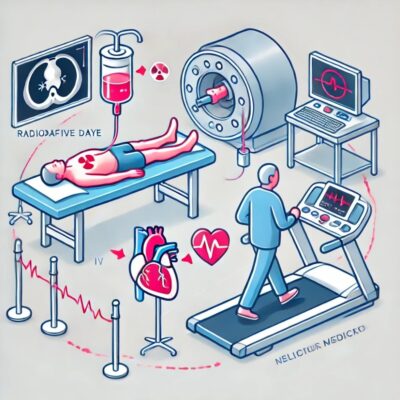nuclaer stress test
Nuclear Stress Test-Myocardial Perfusion Stress Test

A nuclear stress test is a heart test that uses a small amount of radioactive dye and a special camera to take pictures of your heart. It helps doctors see how well blood flows to your heart, both at rest and during exercise. The test can show areas with poor blood flow or damage in your heart.
Types of Nuclear Stress Tests
- Walking Stress Test (Bruce Protocol): You walk on a treadmill, and images of your heart are taken before and after exercise.
- Pharmacological Stress Test: If you cannot walk on a treadmill, you will receive a medication through an IV that mimics the effects of exercise on your heart.
Before the Test
- Fasting: Do not eat for 4 hours before the test. You may drink water.
- No Caffeine: Avoid caffeine for 24 hours before the test. This includes coffee, tea, chocolate, soft drinks, and even decaffeinated beverages.
- Medications: Hold certain medications like beta-blockers, calcium channel blockers, and nitroglycerin on the morning of the test. Take all other medications with water, except your diabetes medication if fasting.
- Diabetes: Skip your oral diabetes pill if not eating. If on insulin, take half your normal dose.
- Comfortable Clothing: Wear comfortable clothes and shoes for the test.
During the Test
- IV Injection: A small needle will be placed in your arm or hand, and a liquid with a small amount of radioactivity will be injected to create clear images of your heart.
- Imaging: After 30 to 60 minutes, you will lie on a table while a camera rotates around your chest to take pictures of your heart. This takes less than 30 minutes.
- Exercise or Medication: If exercising, you will walk on a treadmill starting slowly, with the speed and incline gradually increasing over 5 to 15 minutes. If not exercising, you will receive medication through your IV that mimics exercise.
- Second Set of Images: After the stress portion, more images of your heart will be taken.
After the Test
You should receive your results within 3 days. If you haven’t heard within a week, call your doctor.
What About Radiation?
The amount of radiation from a nuclear stress test is small and similar to other common imaging tests like mammograms. The risk of cancer from this type of test is extremely low, and the benefit of detecting heart disease far outweighs the small radiation risk, especially for people in their 60s and 70s.
